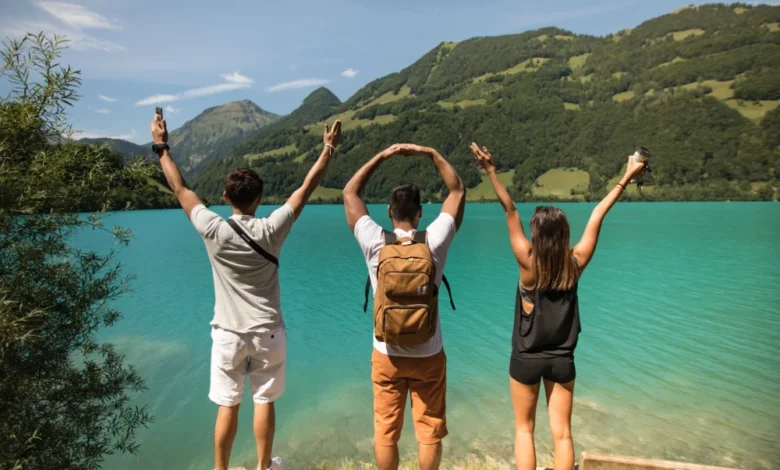This year promises to be a record year for European tourism: what is being said in the foreign media

The year 2024 promises to be a record year for European tourism in terms of the number of visitors and financial turnover. However, along with economic growth, the number of problems associated with negative consequences for the environment and the housing market increases. Also, more and more voices are expressing concern about the difficulties faced by tourists themselves.
European experts discuss possible ways to solve them, paying attention to successful examples of implementation of environmental initiatives, regulation of visitor flows and involvement of local communities in the management of tourism activities.
Bet on positive impulses
Sydsvenskan – Sweden. This summer, Copenhagen launched CopenPay, a campaign aimed at encouraging tourists and locals to act more environmentally: those who pick up litter, cut weeds or choose a bike instead of a car can, for example, receive a cup of coffee or free entry to events .
Edition Sydsvenskan under the impression:
“Such bartering can bring benefits not only in reducing the negative effects of otherwise valuable tourism. It can promote cohesion and cultural exchange between residents and visitors to Copenhagen, as well as between Copenhageners themselves. CopenPay allows participants to take care of their city on a daily basis, making contacts and sharing experiences with guests”.
Clear information and regulation of the flow of visitors
Le Temps – Switzerland. In her article for the Parisian edition of Le Temps, the director of the popular among tourists Chillon Castle on Lake Geneva, Marta Sofia dos Santos, writes that the museums of Amsterdam can be an example to follow:
“We take an example from foreign models, where systems of pre-booking and quotas of the number of guests are introduced to regulate the flow of visitors. The experience of museums such as the Anne Frank House or the Rijksmuseum in Amsterdam shows that the solution can be the use of quotas, as well as clear information and effective management — in this way, conditions for visitors can be significantly improved. However, such an approach requires a digital strategy, which not all institutions are able to implement. Therefore, it is necessary to allocate funds for employee training.”
Fees and restrictions should not remain taboo
El País – Spain. The Madrid edition of El País calls for a new definition of success for the tourism industry:
“Finding solutions should be done by local authorities, citizens and the tourism industry, which itself perfectly understands that success is not measured only by the number of visitors. The first area to start with is the rental of housing for tourists. It is also worth considering the introduction of an official fee or setting restrictions on the number of tourists in order to balance and redistribute the flows of travelers. The quality of the improvements should be measured not only by the revenues of the industry, but also by the satisfaction of the citizens. In this way, it will be possible to ensure that the success story does not turn into a disaster.”
Complex solution to the problem
El Periódico de Catalunya – Іспанія. The deputy editor-in-chief of Barcelona’s El Periódico de Catalunya, Gemma Martínez, calls for consistent and interconnected measures:
“There is no doubt that the field of tourism needs to be rethought, not even the representatives of the tourism business itself. This should be done by various specialists, as well as state administration bodies together with economic and social subjects.
This is certainly better than just a series of unrelated “patches” in different industries and spheres — such as, for example, the initiative to undertake only the rental of apartments to tourists. Even if restrictions are possible, I think that positive measures like those currently implemented in Denmark are much better. In this country, they decided to introduce bonuses for visitors who behave ecologically. This is such an example that should be adopted!”.
Involve local communities
To Vima – Greece. In the pages of the Athens publication To Vima, the Minister of Tourism of Greece, Olga Kefaloyanni, reflects on how Greece intends to ensure that the country and its people benefit from a thriving tourism, not suffer from it:
“The measures we are taking now are based on the values of moderation and balance, concern for the protection of the natural and cultural environment – and respect for people and local communities. Within this framework, our strategic decision is to involve local communities in the management of tourism activities in order to guarantee a fair and profitable distribution of benefits from tourism. To implement this strategy, we have created a number of modern tools, such as, for example, the National Monitoring Council for Prospective Development of Tourism.”
Enough grumbling!
Aargauer Zeitung – Switzerland. Switzerland should be happy that the number of tourists in the country is increasing, writes the Aargauer Zeitung:
“The tendency to see the bad first” is everywhere in Switzerland when it comes to tourism. For years, we have heard complaints that the country is in decline. That in the winter we are driven away by Austrian tourists, and in the summer there is simply nothing to do in our mountains. And now everything has changed. Everyone is satisfied? ‘Excessive tourism!’ – now everyone around is grumbling.
It is impossible to influence the weather, and the flow of tourists – only relatively. Let’s overcome this negative view of everything and be happy that our country is more popular than ever among Americans! They leave a lot of money here!”.





